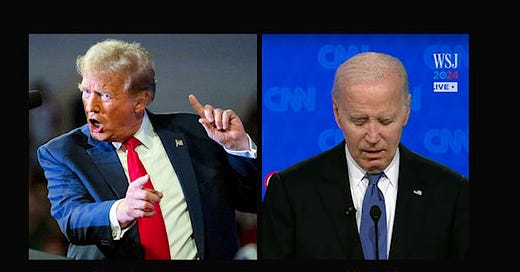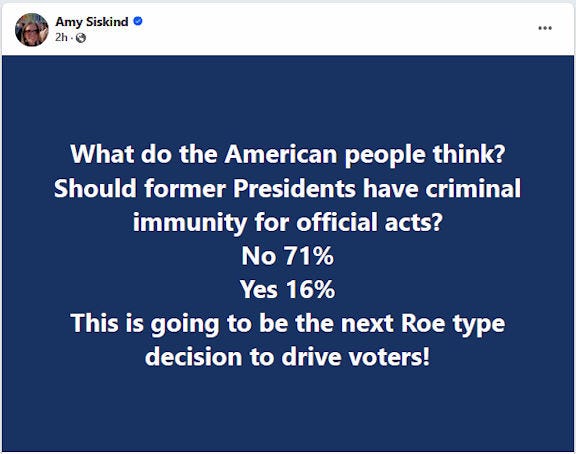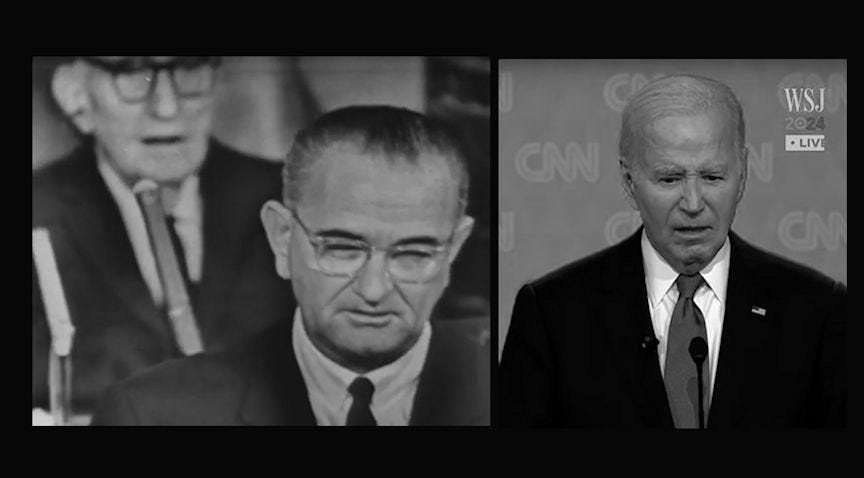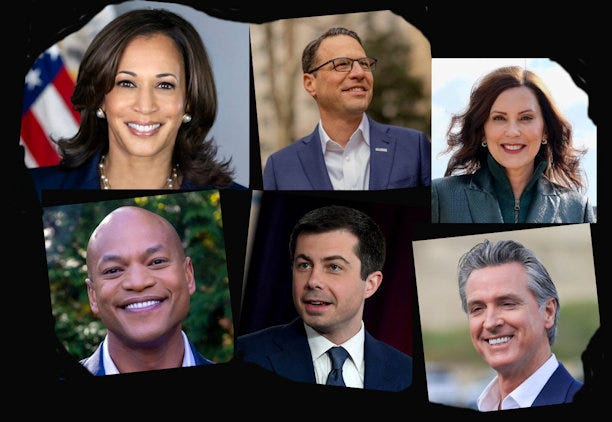The choice depicted above should be no contest. Biden should win overwhelmingly. But ...
The Stakes Have Never Been Higher in an American Election
The choice presented above should be obvious. Biden should win in a landslide. But the stakes in the 2024 Election are, especially after the six Injustices came out for monarchy yesterday, higher than they have ever been in American history – greater even than in 1864, when the survival of the Union was at stake, but while a Lincoln defeat and a Confederate victory would have lost the southern states and left enslavement intact there – a horrible result – the United States would have continued as a smaller democratic republic. That may well not be the case if the Democrats do not win this year. A Trump victory might write “THE END” on the American Experiment in democracy and freedom.
Cartoonist Jeff Danziger nicely captured how the media covered the debate and, alas, how they will continue to “cover” the election if it remains Biden vs. Trump.
Though there is little hope that the media will ever stop treating it as just another horse race between the major parties, the 2024 Election has long been about the stakes, and those already-high stakes rose exponentially with the right-wing Supreme Court majority’s outrageous decision yesterday that, at least in some areas of conduct, the President is above the law.
Three days before we celebrate the establishment of a nation based on the ideal of equality and rule by the people, the anti-Republic members of the Court took the side of the monarchists our ancestors rejected.
So, the question that must be decided soon is whether defeating authoritarianism and saving the American Republic is more likely with Biden or someone else.
“Republicans v. Women” (2022) and Trump v. United States (2024)
The decision to replace the Constitution’s checks and balances by placing a crown on the head of the American president points us in two different directions on the question. While it makes it even more imperative that we choose the candidate most likely to defeat Trump (and to defeat him soundly), the decision also makes it more likely that a substantial majority of Americans will vote for anyone, including Biden, who is the alternative to Trump. Amy Siskind pointed out today that the decision in the aptly named Trump v. United States, which is tied around “Republican” necks as much as the Dobbs v. Jackson Women's Health Organization women-don’t-own-their-own-bodies decision, is also extremely unpopular:
Those two widely detested decisions—along with so much else about Trump and MAGA “Republicans” — Trump is talking openly about concentration camps, arresting his political rivals, shutting down media that do not support him, executing people — should be sufficient to assure a big victory for Democrats and democracy.
Trump “re-truthed” (a wonderfully appropriate word for lied) the idea of having televised military tribunals to try Liz Cheney and others who dared to oppose him.
Surely, the American people will vote for anyone against this nightmare, won’t they?
But can we be certain?
As I wrote yesterday, the defeat of Trump and the authoritarian movement he heads is the only consideration we should have in mind in choosing the best course.
It’s not about fairness, candidates’ feelings, what demographic group a possible nominee belongs to, or anything else. It is about who can best assure the defeat of fascism in America.
It is not a good time for incumbents, as is evident in the success of the far-right party in France on Sunday and the almost certain crushing defeat the Tories face this coming Thursday in the United Kingdom. French President Emmanuel Macron made a monumental mistake in calling a quick election. In retrospect, Biden and his staff also made a big mistake in calling for an early debate.
However, there are two important differences between the elections in France and Britain and those coming up in the United States. The European countries are in bad shape. Despite Trump’s immense lies, the United States is in good shape economically and militarily—by far the best in the world.
And in the American election, both current candidates amount to incumbents. Voters willing to take the trouble to do so can easily see how much worse things were under Trump.
I happened to notice a clip on television this morning of Lyndon Johnson addressing Congress and the American people five days after the assassination of President Kennedy. My eye was drawn to Speaker John McCormick sitting behind LBJ with his mouth hanging partially open and looking far older (at least by today’s standards) than he was: a few weeks short of 72). It struck me that a similar image of Joe Biden has now been planted in millions of minds, and it will be reinforced by millions of dollars of MAGA propaganda.
Of course, this image isn’t fair, but it’s what people will remember; it will be indelible in their minds.
Some voters who have been interviewed in the days since the debate are saying that they worry that President Biden may not be capable of governing for the next four years. Well, we already know that Donald Trump is utterly incapable of governing in a democratic fashion at any time.
Still, the idea that Biden will be able to be effective as president until January 2029, when he will be 86, is a stretch. His bad moments in the debate last Thursday were reminiscent of Ronald Reagan wandering off on the Pacific Coast Highway during his closing statement in the second 1984 presidential debate with Walter Mondale. Reagan was 73 at the time. He recovered in the next debate with his great one-liner about not making his opponent’s youth and inexperience an issue. But, with hindsight, it is plain that the moment in the second debate was a hint of the coming Alzheimer’s that would later debilitate Reagan.
I am not suggesting for a second that Joe Biden has a similar condition—though surely it will be suggested by people in MAGA. And it will be an issue for some voters.
So, what is to be done?
It is more than understandable that Joe Biden does not want to step aside, and any attempt to remove him against his will would be disastrous.
It would be a difficult pill for him to swallow, but Biden’s love for America and democracy might be sufficient to lead with to withdraw if he were to see that defeating Trumpism would be more likely with someone else heading the ticket.
That is still very much an open question. For ourselves as much as for him, we need to take a week or two to gather information on that question.
I suggest:
■ See what polls indicate over the next week or so.
■ Biden has to have extended televised interviews, as it was just announced he is doing with George Stephanopoulos of ABC.
■ Biden must do multiple unscripted town halls in the next ten days to see how he holds up and whether any of the bad moments from the debate occur again.
■ Then, prior to the opening of the Republican Convention on July 15, Biden, his family, and Democratic leaders should have a private meeting to assess the situation. If it seems clear that Biden is not an almost certain bet to win, he should be asked to step aside.
■ If all goes well and his polls are improving, fine.
■ Before that sit-down, a Plan B should already be at least partially mapped out (this should be done in any case, since no one knows what might happen in the remaining months before the election).
■ Biden would then give a nationally televised address, ideally an evening or two before the start of the “Republican” convention, in which he withdraws to assure the preservation of the American Republic, explaining that he is healthy, but is also selfless and wants to do what is best for his beloved nation. Immediately following the address, someone of note would explain the Plan B—let’s call it the Plan to Preserve American Freedom & Democracy—by which a new candidate will be chosen.
This would, as Jonathan Alter outlined in the New York Times on June 28, leave the Republicans not knowing whom they should be attacking during their convention and oblige them instead to have to “explain what they want to do for the country, and the public would realize the only answer is: nothing but harm it in unpopular ways.”
Alter suggests that Biden himself would announce the ground rules for candidates, something along the lines of:
None of the candidates in the next seven weeks — about the typical length of European campaigns, by the way — may attack rivals or spend money on their own campaigns that will be needed in the fall against Donald Trump. If any do, Biden will come out against them.
Only those with a certain threshold of support in polls may take part in any Democratic debates to be scheduled before the convention.
Each qualifying candidate will be granted a half-hour address on the opening night of the convention, with the winner expanding on it in his or her acceptance speech.
The delegates should take into consideration — though not be bound by — state and national polls showing the relative strengths of the candidates.
The candidates should identify possible running mates.
Democratic strategist James Carville has suggested a similar idea, which Maureen Dowd presented in a recent column: President Biden should give “a speech announcing he will let the next generation of Democratic leaders bloom.”
I proposed some of the possible contenders in my essay on Friday:
Vice President Kamala Harris, Pennsylvania Gov. Josh Shapiro, Michigan Gov. Gretchen Whitmer, Maryland Gov. Wes Moore, Secretary of Transportation Pete Buttigieg, California Gov. Gavin Newsom.
There are, to be sure, others. Finalists—I would suggest “The Final Four”—would speak on the first night of the Democratic Convention, August 19.
“You know what the ratings for that would be?” Carville asked rhetorically. “The whole world would watch and people would go, ‘Oh, God, they have real talent!’”
It would be “must-see-TV.” Not “reality TV,” which is scripted and where the stakes are negligible, but actual reality in which the stakes are the highest.
The next day, into evening prime time, delegate votes—probably multiple ballots—would take place as the nation watched.
On Wednesday evening Biden would be honored as what he is, one of the greatest presidents in American history. Others would detail all he has accomplished, which is what the nominee will be continuing. The President himself could either speak then or on Thursday in introducing the nominee to give her or his acceptance speech.
(Such a convention would also preclude or totally overshadow potential protests against the President’s support for Israel.)
That nominee would begin the general election campaign with a big lead on the authoritarian opposition.
Whichever way we go, losing is not an option this year.











I’m not sure. But I no longer listen to Carville, and I’m not alone (K does, and when he talks about what he suggests I listen in silence). If that’s his plan, I’m immediately suspect. Just my 2 cents’ worth. I agree it’s not good.
I like this approach, especially the script for the Democratic Convention.